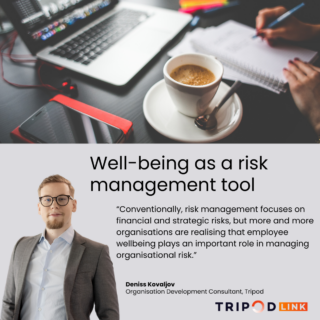
We spoke to a number of CEOs and HR managers from large organisations in Baltics to get their views on organisational research – its importance, content expectations and value to the organisation. During the interviews, we uncovered different topics that are important for successful companies today, and the aspects based on which information and insights are required from the survey.
Focus on and support for employees
The emotional well-being and mental health of employees is an increasingly important indicator for organisations. In recent years, we have seen how strongly people can be affected by the world events. The labour market is characterised by a fast pace and increasing workloads, which have a negative impact on people’s mental health. Companies have realised that by monitoring and systematically addressing employee wellbeing and mental health, it is possible to prevent many work-related problems, such as burnout and silent quitting. This is why emphasis is placed on creating a positive working atmosphere as well as on offering flexible working arrangements to help employees maintain a healthy work-life balance. At the same time, it is considered important that employees understand their own responsibility and their role in influencing their own work and well-being at work. A valued employee is also able to take the initiative and responsibility for his or her own well-being and development needs.
Transparent leadership as a key driver of well-being
According to managers, transparency in decision-making, information sharing and effective communication are critical aspects of corporate leadership that have a direct impact on organisational performance and employee satisfaction. The companies surveyed are continuously working to develop these issues and the survey is one of the key tools to assess the development needs related to information sharing and communication. The managers interviewed pointed out that in their companies the emphasis is on making employees feel involved and taken into account. Managers contribute to this by providing information directly to employees about the running of the company, being available to employees with questions and concerns. Transparent sharing of information also ensures higher employee satisfaction by explaining the ‘big picture’ to employees and helping them to understand the importance of their individual role and the value of their contribution to the success of the organisation.
Leaders are developed systematically and consistently
When asked about the most important leadership qualities, one of the most important is clearly the ability to manage people. Today’s leaders need to be “people people”, able to communicate openly and inspire their teams. However, this style of leadership is not inherent in everyone, and there is a need to support and develop leaders in this area. At the same time, alongside softer skills, strategic leadership skills are crucial. Leaders need to be able to adapt to changing circumstances, to set objectives and to take responsibility for their decisions. The feedback from staff in the survey will help to understand how managers meet these expectations, what their development needs are and how they can be better supported.
The survey should be flexible and compact
Drawing on experience and the opinion of the managers interviewed, we can say with certainty that lengthy questionnaires are increasingly becoming a thing of the past and that shorter surveys are preferred to surveys of employee opinion. There is a growing need to obtain feedback from employees more frequently in order to be able to react more quickly and implement changes. This is why many organisations have adopted the ‘pulse survey’, which allows a more operational assessment of the situation in the organisation and allows very specific issues to be targeted. It is also important for organisations to be able to adapt the methodology to the situation and needs of the moment, and to complement it with topical issues or questions. Open comments are seen as of great value, as they provide more background to the numerical assessments. Employee comments add to the diversity of the survey and help to get a more accurate picture of what is really happening in the organisation.
Transparency and inclusiveness are essential
Interviews revealed that transparency is increasingly important for organisations when talking about and deciding on results. Traditionally, results are worked on at several levels – at senior management level more on strategic issues and broader objectives, and at team level on more operational issues and the nuances of day-to-day work. According to managers, it is considered important that employees have a say in decisions that affect their own work and are involved in the follow-up.
It is pleasing to note that in all the companies surveyed, organisational surveys are carried out in a systematic way and that managers understand their value and the important role they play in the development of the organisation. The topics covered in the survey are well thought out and relevant. These companies also have specific processes in place to deal with the results. Employee involvement through the survey is highly valued, and companies also value a high level of participation, i.e. reaching as many employees as possible.
At Tripod Link, we believe it is important that our approach and methods are up-to-date and meet the expectations that are relevant today – which is why our organisational research methodology has also undergone an overhaul. The input gathered from the interviews helped us to confirm that the principles we followed in developing the methodology are relevant and meet the expectations of our partners.
Stay tuned, because soon we will be talking more about the updated well-being survey methodology!







